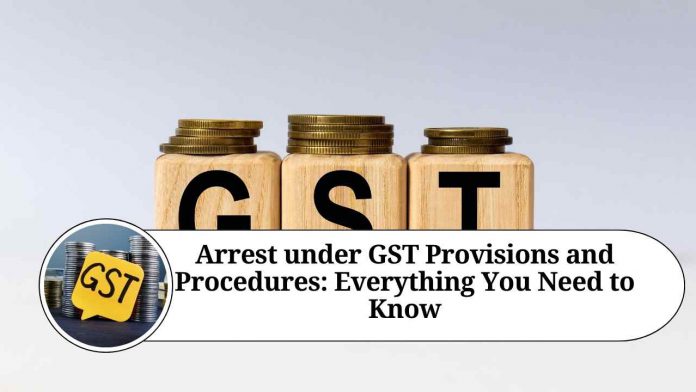Introduction
The Goods and Services Tax (GST) has been implemented in India since July 1, 2017. Since then, it has been a topic of discussion and controversy among taxpayers, businesses, and the government. One of the most significant powers given to GST authorities is the power to arrest taxpayers who have committed certain offenses. In this blog, we will discuss the provisions and procedures related to the arrest of taxpayers under the GST regime.
GST Provisions Related to Arrest: Under Section 69 of the Central Goods and Services Tax Act, 2017, the GST authorities have been given the power to arrest a person in certain cases. These cases include:
- Fraud: If a person has committed fraud under GST, which includes submitting false invoices or documents, claiming input tax credit (ITC) fraudulently, or suppressing sales to evade taxes, the GST authorities can arrest them.
- Non-payment of Tax: If a person fails to pay the tax collected or payable under GST within a period of three months from the due date, and the amount of tax involved is more than Rs. 2 crore, the GST authorities can arrest them.
- Repeat Offender: If a person has been previously convicted of an offense under GST and commits a similar offense again, the GST authorities can arrest them.
Procedures for Arrest under GST: Before arresting a person under GST, the authorities must follow certain procedures. These include:
- Reason to Believe: The authorities must have a reason to believe that the person has committed an offense under GST that warrants arrest.
- Arrest Order: The authorities must issue an order of arrest specifying the grounds of arrest.
- Arrested Person to be Informed: The person being arrested must be informed of the grounds of arrest and the reasons for such grounds.
- Place of Detention: The arrested person must be detained in a place authorized by the Commissioner of GST.
- Production before Magistrate: The arrested person must be produced before a magistrate within 24 hours of the arrest.
- Magistrate’s Order: The magistrate may order the detention of the person for a period not exceeding 15 days. If the offense is non-bailable, the person may be detained for a longer period.
- Bail: The person arrested may apply for bail, and the magistrate may grant bail if satisfied that the grounds for arrest are not justified.
Conclusion
The power of arrest under GST is a significant tool in the hands of the GST authorities to ensure compliance with the GST laws. However, this power must be exercised with caution and only in cases where it is warranted. The procedures for arrest must be followed strictly to ensure that the rights of the person being arrested are not violated. As a taxpayer, it is important to be aware of the provisions and procedures related to arrest under GST to avoid any violations and to protect oneself from wrongful arrest.
Other Related Blogs: Section 144B Income Tax Act
Frequently Asked Questions (FAQs)
Q: Who has the power to arrest a person under GST?
A: The GST authorities, which include GST officers, Commissioner of GST, and other authorized officers, have the power to arrest a person under GST.
Q: What are the cases in which a person can be arrested under GST?
A: A person can be arrested under GST for committing offenses such as fraud, non-payment of tax, and being a repeat offender.
Q: What is the threshold amount for non-payment of tax, after which a person can be arrested under GST?
A: The threshold amount for non-payment of tax is more than Rs. 2 crore, and the person must have failed to pay the tax within three months from the due date.
Q: Can a person be arrested for a minor offense under GST?
A: No, a person cannot be arrested for minor offenses under GST. The arrest can only be made in cases where the offense is serious and warrants such action.
Q: What is the procedure for arrest under GST?
A: The procedure for arrest under GST includes the authorities having a reason to believe that the person has committed an offense, issuing an arrest order specifying the grounds of arrest, informing the arrested person of the grounds of arrest, detaining the person in an authorized place, producing the person before a magistrate within 24 hours, and obtaining the magistrate’s order for detention or bail.
Q: What are the rights of a person who has been arrested under GST?
A: A person who has been arrested under GST has the right to be informed of the grounds of arrest, the right to legal representation, the right to be produced before a magistrate within 24 hours, and the right to apply for bail.
Q: Can a person be detained for a longer period than 15 days?
A: Yes, if the offense is non-bailable, the person may be detained for a longer period than 15 days, subject to the order of the magistrate.
Q: Can a person be arrested under GST without prior notice?
A: Yes, a person can be arrested under GST without prior notice if the authorities have reason to believe that the person may abscond or evade the arrest.




















